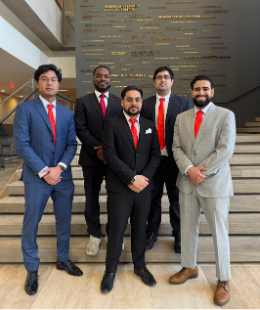Stepping into Business from a Science Background
When I started the MSc in Management (Business Analytics) program at Ivey Business School, I knew that I was stepping into an unfamiliar discipline. My academic background was in the sciences, where I had earned a Bachelor of Medical Science degree with an Honours Specialization in Pathology. Much of my time was spent studying the mechanisms of diseases, analyzing complex biological systems, and learning how to diagnose problems from imperfect or incomplete data
However, what I come to realize now is how closely aligned the scientific discipline was with business analytics. Both fields rely on hypothesis-driven thinking: you begin with a question, collect and analyze data, search for patterns, and ultimately draw insights. While that technical overlap helped ease the transition, the way we learned at Ivey was an entirely different experience.
Where Theory Meets Action: Ivey’s Case-Base Teaching Methodology
What I was most nervous about coming into program was what Ivey was best known for: its case-based teaching methodology. Instead of traditional lectures, each class was centered around a real-world business problem. As a student, you are expected to arrive with a recommendation, defend your thinking, and engage with opposing viewpoints – similar to a real-business setting
Coming from a non-business background and being naturally more introverted, I found this format intimidating. At first, I played it safe, sticking to case-facts and surface-level observations. But I soon realized that unlike sciences, business rarely has a single correct answer. The real objective was not to have the perfect answer, but to think critically, learn through discussions, and grow from diverse perspectives. Over time, I became more comfortable speaking up, even when I was not entirely sure, largely due to how encouraging the professors were. Overall, I found that the more I contributed, the more I learned, ultimately building my confidence in expressing my viewpoints, both in the classroom and beyond.
Learning by Doing, Together: Learning Teams
Beyond Ivey’s case-based teaching methodology, what I appreciated most was how collaboration was embedded in nearly every aspect of the learning experience. From day one, you are not expected to navigate the program alone. At the start of each semester, you are placed in a learning team that is comprised of six to seven classmates, each bringing different personalities, communication styles, and perspectives. Together, you engage in case discussions, tackle group projects, and support one another when the workload feels overwhelming.
Working in teams is not always easy, but over time, you learn to navigate through each other’s strengths and weaknesses, challenge ideas constructively, and come together to deliver your best work when it matters the most. Some of my favourite moments at Ivey came from those team experiences – whether it was staying up late to finish the 40-40-40 project or pushing through the 24-hour report. By the end of each term, your teammates are no longer just classmates; they become some of your closest friends. The bonds formed are real and lasting, and I feel incredibly fortunate for every learning team I have been part of and the people I have met along the way. They are what makes the Ivey experience so special and what turns this program into something truly unforgettable.
Turning Insights into Impact: Hack the Case
Recently, I participated in Hack the Case, a two-week competition sponsored by Scotiabank and SAS. My team, “Master of None”, tackled the challenge of predicting which younger clients were likely to become high-value customers over the next 15 years, followed by designing innovative treatment strategies and product mixes to nurture those relationships. The competition began with an intensive two-day SAS training, equipping us with the tools to preprocess data, understand consumer behaviour, build predictive models, and translate insights into actionable strategies.
The experience culminated in a final presentation to a panel of judges from Scotiabank, SAS, and Ivey. Although we did not win, I am incredibly proud that our team was selected as finalists and had the opportunity to present on the big stage. I thoroughly enjoyed working with my teammates and appreciated the dedication and commitment each person brought. The synergy we developed was apparent, as evident from our matching red ties.

Closing Remarks
Ultimately, the Ivey experience is just as much about what happens outside the classroom as within it. Whether it is contributing in class, collaborating with diverse teams, or tackling real-world challenges through case competitions, the opportunities for growth are immense. The MSc program is intentionally designed to push you, and that is a good thing. As one of my professors said, “This program is meant to put you out of your comfort zone – otherwise, you are not learning.” And that is exactly what this program does to shape students into confident, collaborative, and thoughtful business leaders that will be well-prepared for success beyond graduation.
If you have made it this far into the post, I encourage you to take the leap and apply to the Ivey MSc in Management program.
